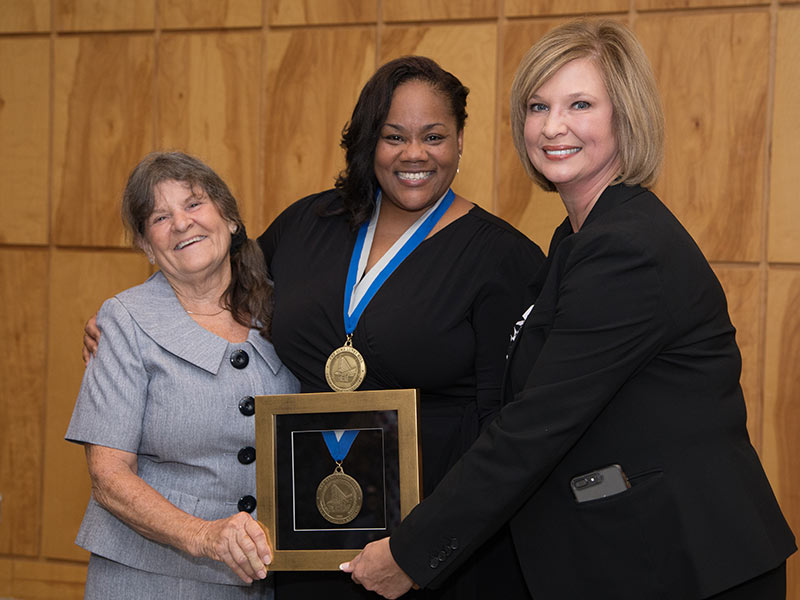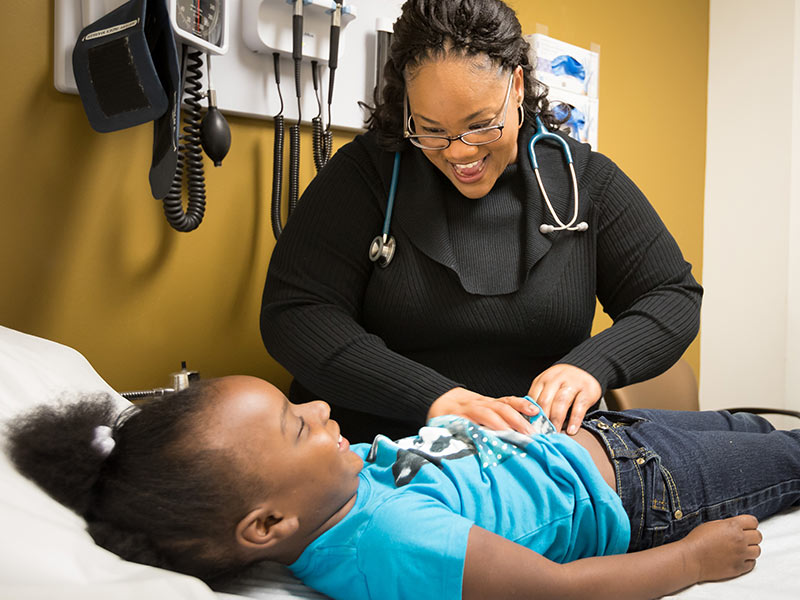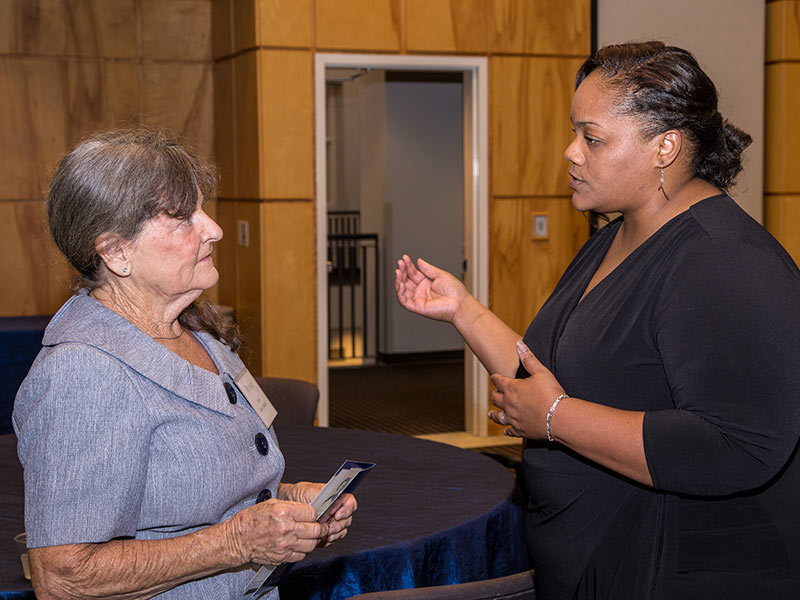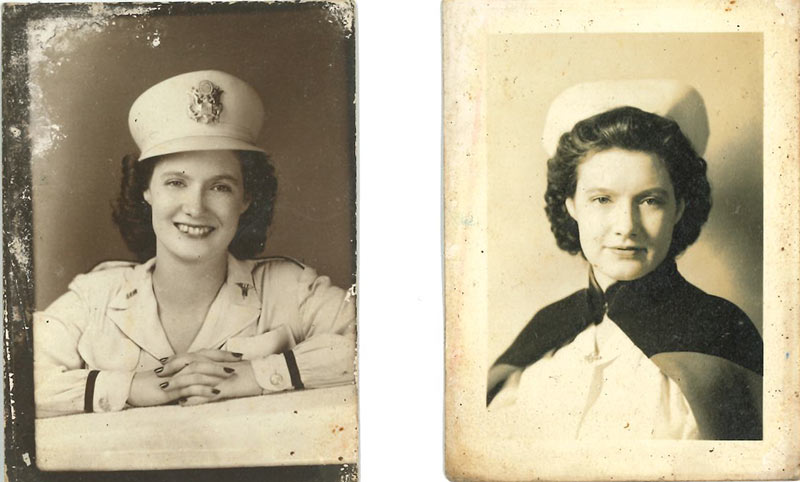Family medicine difference makers' lives bridge barriers of distance, time

Dr. Shannon Pittman and the late Alma Lowry Hill were separated by generations and more than half of a continent’s width.
But the two women, who never met, are linked by a similar sense of place, a devotion to health care, a love of education, and now, by name: Pittman is the first-ever holder of the Alma Lowry Hill Chair of Family Medicine at the University of Mississippi Medical Center.
Pittman, professor of family medicine, and the endowment from the Alma Lowry Hill and Robert Hill Trust were celebrated Thursday at UMMC with a reception attended by, among others, Pittman’s family and Hill’s niece, Carol Lowry Baird of Clinton, who taught for decades in Jackson Public Schools.
“My aunt was a nurse, and a very sweet, caring person,” Baird said. “She would be glad the money is going to help others in Mississippi. Dr. Pittman is very enthusiastic and very personable and seems to really want to do a good job.”
The reception offered the first chance for Pittman, a Pike County native, to meet a relative of the longtime San Diego resident who was born in Carroll County and whose legacy has benefitted the education of students in the schools of nursing and medicine, as well as the educational initiatives of the Center for Bioethics and Medical Humanities at UMMC.
The trust, which also bears the name of Hill’s late son, Robert, has distributed around $3.4 million to the Medical Center over the past 2 1/2 years.
Another Carroll County native, Dr. LouAnn Woodward, vice chancellor for health affairs and dean of the School of Medicine, chose to use $1 million from the trust to endow the chair now held by a physician who has been a fixture at UMMC since 1998, when she was a medical student.
In formally announcing the endowment, Woodward described Hill as “a person who left the state but never forgot where she came from and who is supporting the work of another Mississippi girl … . I think that’s the theme of the night: what a difference Mississippi girls can make.”
Pittman, who has called herself, “at heart, a simple country girl,” is one of two daughters who grew up running barefoot and diving into the creeks near Summit, the town where many of her relatives still live.

Members of her church family, medical family and her family by blood, including her parents Lynn and Hazel Pittman of Summit, and Pittman’s husband Charles Moore, were on hand Thursday to see her receive the Chair of Family Medicine medallion.
In addressing those who gathered in the Student Union for the occasion, Pittman acknowledged the support she has enjoyed, especially from her loved ones: “I am grateful for all that each of you have poured into me. I hope that I always honor the prayers you prayed and the sacrifices you made.
“Please know that the titles that really matter and the ones I hold dearest to my heart will never be MD, PD and not even chair. But wife, granddaughter, daughter, sister, aunt, niece, cousin, friend and kiddo.”
Upon her father’s arrival at the reception, the daughter was greeted with these words: “Hey, baby, you’re making me proud. You’re still making me proud,” Lynn Pittman said.
That sense of pride began long before Shannon Pittman’s grades at North Pike High School earned her a full scholarship to Tougaloo College; and long before she dove into medical school. In 2005, she joined the Medical Center faculty, following a standout performance as a resident.

Because she wanted to see patients of all ages, she chose family medicine. Later, at the suggestion of Dr. Lessa Phillips, one of her mentors and the department chair at the time, she chose to teach as well.
In her remarks, Pittman recounted the upshot of that meeting with Phillips: “ … I left her office and thought if she believed I should teach, I should at least give it a try. Fourteen years later, the keys to the same office where we sat and discussed my future are now in my purse, because they’re mine, because it’s my office. How incredible is that?”
The wisdom of her choices has been reflected over the years: She served as chief resident and received the department’s highest award at graduation: the George Lally Bevill Memorial Fellowship in Family Medicine. She is a multiple winner of the Golden Stethoscope Family Medicine Faculty of the Year Award. In 2014, she was recognized for her preventive health initiatives by the American Academy of Family Physicians, which presented her with its Childhood and Adolescent Immunizations Award.
It was in November 2017, after serving more than four months as interim leader of the Department of Family Medicine, when Pittman became only the fourth department chair ever, succeeding another of her mentors, Dr. Diane K. Beebe, upon the latter’s retirement.
Now that the chair has been endowed, Pittman is the recipient of “the highest honor the Medical Center can bestow upon a faculty member,” Woodward said.
In the Medical Center’s 63-year history, there have been only 24 other endowed chairs, which provide perpetual support for their respective departments.
This one is named for a woman born Willie Alma Lowry in 1919 on her family’s farm of livestock and crops, and who grew up as one of eight children in a house her father built, with no running water, plumbing or electricity. The one-room schoolhouse she attended in the Bluff Springs community doubled on Sundays as a Methodist church.
After training as a nurse in Vicksburg, she worked for a while in Monroe, Louisiana, then enlisted in the U.S. Army Nurse Corps in the Pacific during World War II. She left the service with the rank of 1st lieutenant and a Bronze Service Star.
With her G.I. Bill benefits, she paid for her undergraduate education at Washington University in St. Louis, Missouri. Her work as a nurse and nursing school educator took her to several cities, including Denver, Colorado, before she settled in San Diego, California.

At one point, she worked as a school nurse for 25 years. But she never stopped learning. By attending night school, Hill earned her Master’s in Pediatric Nursing and became a nurse practitioner.
Her love of education and medicine translated into her gift – a scholarship fund for future physicians and nurses back home in Mississippi – even as she continued to live out the remainder of her life in California. She was 90 when she died, on March 5, 2010.
“She lived in the same house her whole life out there,” said her great-nephew, Colin Baird, a civil engineer and land surveyor with a business in Clinton. “She could be satisfied with very little,” said Baird, the son of Carol Baird, in a phone interview. “She was probably like many other people who experienced the Great Depression; she believed in tucking her money away, for security.
“And she really felt a connection back here. She wanted to bring something back to Mississippi. I believe when people set up trusts like this in a university, it says a whole lot about who they are.”
For her part, Pittman paid tribute to the benefactor she never met: “… [T]he beauty of this gift that [Ms.] Hill has given to us … is the ripple effect of faculty development, patient engagement, resident education and student recruitment that will result … . The ripple effect of ordinary people working to accomplish incredible things. The catalyst that propels us further than we had hoped possible.”
Dr. Shannon Pittman's remarks after being named the first Alma Lowry Hill Chair of Family Medicine:
Thank you, Dr. Woodward, for this honor, for your leadership and for the courage you displayed back in November by giving this little Mississippi girl the opportunity to serve. I am grateful to be a part of the University family and for the opportunity to contribute to a healthier Mississippi as a champion for primary care.
My words are not eloquent enough to express my sincere gratitude to [Ms.] Alma Lowry Hill for her gift that made this endowment possible, and I am humbled to be the first recipient of this award.
I am indeed a Mississippi girl and am pretty sure that growing up in Pike County – Pittmantown to be exact – makes me a country Mississippi girl at that. I was blessed to have the opportunity to grow up loved. Uninhibited and unlimited. Able to dream freely about my future. Surrounded by people who loved me before any titles and any awards, and I am confident would love me still if all of those things went away.
I am grateful for all that each of you have poured into me. I hope that I always honor the prayers you prayed and the sacrifices you made. Please know that the titles that really matter and the ones I hold dearest to my heart will never be MD, PD and not even chair. But wife, granddaughter, daughter, sister, aunt, niece, cousin, friend and kiddo. Those are the titles that matter.
The space that you create for me to be just me is a space where I find security and comfort. A space that restores my soul, fuels my dreams and empowers me to be fearless.
Fourteen years ago, Dr. [Lessa] Phillips called me to her office and asked me what I planned to do with my life. I smiled and told her that I planned to go back to Pike County and take care of my people. Being a Pike County girl herself, she said going back would be a good idea.
But then she asked if I have ever thought about teaching. To be truthful, I had never considered it. But I left her office and thought if she believed I should teach, I should at least give it a try. Fourteen years later, the keys to the same office where we sat and discussed my future are now in my purse, because they’re mine, because it’s my office. How incredible is that?
I am unsure if in that moment many years ago she knew where my path would lead. “Ripples,” she said. “Teach these kids and create ripples that flow far beyond what your eyes can see or even imagine.”
I believe that is the beauty of this gift that [Ms.] Hill has given to us. It is the ripple effect of faculty development, patient engagement, resident education and student recruitment that will result from this endowment. The ripple effect of ordinary people working to accomplish incredible things. The catalyst that propels us further than we had hoped possible. For, while it may seem small, the ripple effect of small things is extraordinary.
I have the awesome privilege to serve in a department full of people who are talented beyond measure and have limitless potential. We are committed to the work and to each other and we are not short on dreams. Big dreams, at that. This endowment will help to breathe life into our dreams for years to come.
Dr. King said that faith is taking the first step when you don’t see the whole staircase. Fourteen years ago, I don’t think I could even clearly see the first step. But what a remarkable journey this staircase has provided. And though I am still not able to see the full staircase tomorrow, I’ll keep climbing, and the next day, I’ll climb. Clothed in a tapestry woven together by the faith and strength of the people that fill this room and the hope and love of those who are absent.
I am unwavered by the challenging work that lies before us, by the reality of the poverty-stricken, marginalized patients in this our dear state who need and deserve access to good, quality and compassionate health care. I am certain that if we continue to press forward, anchored in our commitment to just do good, and knitted together in our fight for a better and healthier Mississippi, somewhere along the climb, we will find ourselves victorious.
So, for now, this little Mississippi girl will just keep climbing.


